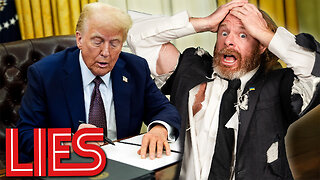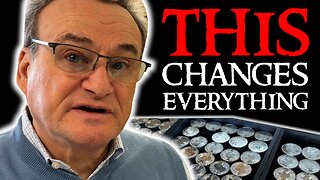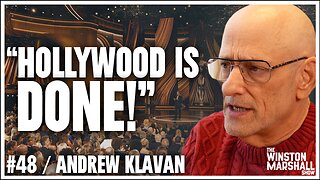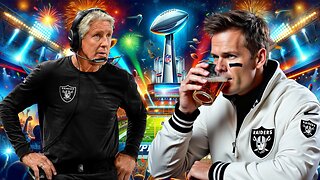Premium Only Content

"Assassins" a darkly satirical musical by Stephen Sondheim
Prologue
- The Shooting Gallery: The show opens in a grim carnival setting. A Proprietor invites disillusioned individuals to "step right up" and take a shot at achieving their dreams by assassinating a president. Each assassin enters and is given a gun as they are introduced in song. The carnival motif establishes the darkly satirical tone.
Scene 1: John Wilkes Booth
- Setting: April 14, 1865, in the moments leading up to Booth assassinating Abraham Lincoln at Ford’s Theatre.
- Booth justifies his actions, claiming he is avenging the South and preserving his honor. His rhetoric positions him as a tragic hero in his own mind.
- Other characters, representing voices from history, criticize Booth, labeling him a traitor. He defends his legacy, setting the theme of self-justification that runs throughout the play.
Scene 2: Leon Czolgosz
- Setting: Early 1900s, at a rally for anarchist Emma Goldman.
- Czolgosz, the man who assassinated President William McKinley, is captivated by Goldman’s fiery speech. He is drawn to her ideas about inequality and oppression, which fuel his justification for assassinating McKinley.
- Song: "The Gun Song"—a haunting melody where Czolgosz and other assassins sing about the power and accessibility of guns, tying their personal motives to broader societal issues.
Scene 3: Charles Guiteau
- Setting: 1881, following the assassination of President James Garfield.
- Guiteau is portrayed as a delusional, flamboyant figure convinced that his actions will secure him fame and divine reward.
- Song: "The Ballad of Guiteau"—a jaunty tune where Guiteau dances to the gallows, singing about his certainty that God will absolve him.
Scene 4: Giuseppe Zangara
- Setting: 1933, during an attempt to assassinate President-elect Franklin D. Roosevelt.
- Zangara, plagued by severe pain, expresses his anger at the system and his frustration at being powerless. His actions stem from personal misery rather than a grand political ideology.
- Song: "How I Saved Roosevelt"—a vaudeville-style number where bystanders who thwarted Zangara take center stage, highlighting the randomness and spectacle of his failed assassination attempt.
Scene 5: Samuel Byck
- Setting: 1970s, inside Byck’s car as he records rambling audiotapes for public figures, including Leonard Bernstein and Richard Nixon.
- Byck, who attempted to hijack a plane to crash it into the White House, is depicted as a pitiful, ranting man who feels betrayed by the American Dream.
- Monologue: Byck delivers a darkly comedic and tragic monologue, showcasing his descent into despair and paranoia.
Scene 6: Lynette "Squeaky" Fromme and Sara Jane Moore
- Setting: 1970s, in a comical meeting between two women who attempted to assassinate Gerald Ford.
- Fromme, a devout follower of Charles Manson, and Moore, a scatterbrained woman with little grasp of her motives, are portrayed as absurd and bumbling.
- Song: "Unworthy of Your Love"—a haunting love ballad sung by Fromme (to Manson) and Moore (to Ford), reflecting their twisted devotion.
Scene 7: John Hinckley
- Setting: 1980s, as Hinckley practices shooting at cans while obsessing over actress Jodie Foster.
- Hinckley’s infatuation with Foster drives his attempt to assassinate Ronald Reagan.
- Song: "Unworthy of Your Love" (continued)—Hinckley joins Fromme in a duet, creating a disturbing parallel between his obsession and hers.
Scene 8: The Balladeer’s Interjections
- The Balladeer, a recurring character, serves as a narrator and moral commentator. He frequently critiques the assassins, framing their actions as pathetic and misguided attempts to find meaning.
Scene 9: Lee Harvey Oswald
- Setting: November 22, 1963, in the Texas School Book Depository.
- In a surreal scene, the assassins from earlier in the play converge in Oswald’s workplace. They pressure him to assassinate President John F. Kennedy, claiming that his act will give their lives meaning and validate their own choices.
- Song: "November 22, 1963"—a tense and eerie number where the assassins unite in convincing Oswald to pull the trigger, tying their fates to his.
Finale: "Another National Anthem"
- The assassins sing about their resentment and desire for recognition, presenting themselves as outcasts who deserve a voice in the American narrative.
- Song: "Everybody’s Got the Right"—the finale reframes the opening number, asserting that everyone, even the disillusioned and deranged, seeks happiness, albeit through destructive means.
Themes and Structure
The play ends on a haunting note, forcing the audience to grapple with the assassins’ humanity, the American obsession with fame, and the darker undercurrents of the pursuit of happiness.
Source: Archive.org
-
 3:59:19
3:59:19
Deus Meum Que Jus
1 month agoThe Kybalion: A Study of the Hermetic Philosophy of Ancient Egypt and Greece By: The Three Initiates
726 -
 1:10:38
1:10:38
Awaken With JP
2 hours agoJFK Files to be Released! Trump’s Boss Move - LIES Ep 75
17.8K22 -
 1:50:19
1:50:19
The Quartering
3 hours agoTrump NUKES The Deepstate, BANS Trans In Military & Terminates Dr. Fauci Protections!
47.8K40 -
 58:24
58:24
Uncommon Sense In Current Times
18 hours agoUnbreakable: How Jeff Younger Stands Firm Against Courts, Government, and Personal Attacks
79 -
 1:56:01
1:56:01
Nina Infinity
21 hours agoGOOD NEWS - Infinite Hope # 219 | Birthday Stream with Guests!
4.35K -
 15:08
15:08
Silver Dragons
23 hours agoWhat Will the TRUMP Tariffs Will Do to Silver & Gold Price?
4.5K3 -
 19:37
19:37
Neil McCoy-Ward
6 hours ago🚨 The CRAZIEST Moments From Davos 2025... ! 🔥
2.77K5 -
 2:57:43
2:57:43
Benny Johnson
5 hours ago🚨BREAKING: Trump Live Right Now in North Carolina Disaster Area! Real Leader | Trump Visiting LA
123K133 -
 58:14
58:14
Winston Marshall
4 hours agoHollywood Insider SPEAKS OUT On Woke Hollywood & Trump’s A-List Allies | Andrew Klavan
39.5K19 -
 44:59
44:59
Game On!
4 hours ago $1.53 earnedTom Brady's BIG GAMBLE! Pete Carroll new head coach of the Raiders! | Crick's Corner
20.9K